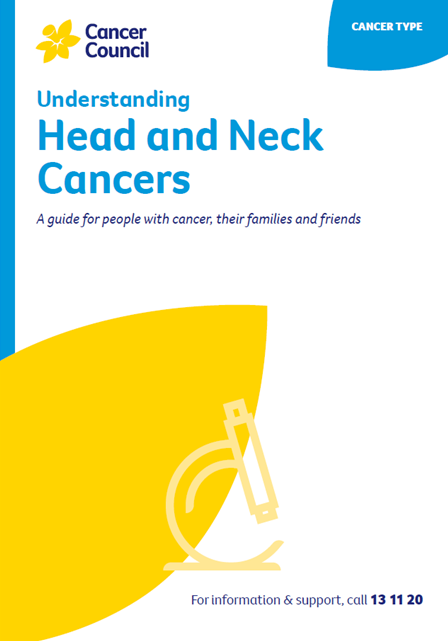- Home
- Head and neck cancers
- Diagnosis
- Staging and prognosis
Staging and prognosis for head and neck cancers
These tests help show whether you have a head and neck cancer and whether it has spread. Working out how far the cancer has spread is called staging. It helps your doctors recommend the best treatment for you.
Learn more about:
TNM staging system
In Australia, the TNM system is the method most often used for staging head and neck cancers. TNM stands for tumour–nodes–metastasis. In this system, each letter is assigned a number to describe the cancer.
| T (tumour) 1–4 | Indicates the size of the primary tumour. Generally, the higher the number, the larger the cancer or the deeper it has grown into the tissue. |
| N (nodes) 0–3 | Shows if the cancer has spread to nearby lymph nodes. N0 means the cancer has not spread to the lymph nodes; the more nodes affected or the more cancer there is within the nodes, the higher the number. |
| M (metastasis) 0–1 | Shows if the cancer has spread (metastasised) to other parts of the body. M0 means the cancer has not spread; M1 means the cancer has spread. |
Based on the TNM numbers, the doctor then works out the cancer’s overall stage on a scale of 1–4 (usually written in Roman numerals as I, II, III or IV). Each type of head and neck cancer is staged slightly differently, and oropharyngeal cancers are staged differently depending on whether they are linked to HPV.
In general, stages 1–2 mean the cancer is small and generally hasn’t spread from the primary site (early head and neck cancer). Stages 3–4 mean the cancer is larger and has spread (advanced head and neck cancer). It may have spread to nearby tissue or lymph nodes (locally advanced cancer) or to other parts of the body (metastatic cancer).
It is worth noting that compared to other cancers, stage 4 head and neck cancers can often be given curative treatment successfully. The stage 4 category can be split into multiple groups, and only one of these subtypes is unlikely to be cured. Ask your doctor to explain what the stage of the cancer means for you.
Prognosis
Prognosis means the expected outcome of a disease. You may wish to discuss your prognosis and treatment options with your doctor, but it is not possible for anyone to predict the exact course of the disease. Instead, your doctor can give you an idea about the general outlook for people with the same type and stage of cancer.
To work out your prognosis and advise you on treatment options, your doctor will consider your test results, the type of head and neck cancer, your smoking history, the cancer’s HPV status (if relevant), the rate and depth of the cancer’s growth, the likelihood of response to treatment, and other factors such as your age, level of fitness and overall health.
In most cases, the earlier head and neck cancer is diagnosed, the better the outcome. People with more advanced head and neck cancer may also respond well to treatment. Oropharyngeal cancers linked with HPV also usually have better outcomes compared with non-HPV oropharyngeal cancers.
→ READ MORE: Your health care team
Podcast: Tests and Cancer
Listen to more of our podcast for people affected by cancer
A/Prof Martin Batstone, Oral and Maxillofacial Surgeon and Director of the Maxillofacial Unit, Royal Brisbane and Women’s Hospital, QLD; Polly Baldwin, 13 11 20 Consultant, Cancer Council SA; Martin Boyle, Consumer; Dr Teresa Brown, Assistant Director Dietetics, Royal Brisbane and Women’s Hospital, Honorary Associate Professor, University of Queensland, QLD; Dr Hayley Dixon, Head, Clinical Support Dentistry Department, WSLHD Oral Health Services, Public Health Dentistry Specialist, NSW; Head and Neck Cancer Care Nursing Team, Royal Melbourne Hospital, VIC; Rhys Hughes, Senior Speech Pathologist, Peter MacCallum Cancer Centre, VIC; Dr Annette Lim, Medical Oncologist and Clinician Researcher – Head and Neck and Non-melanoma Skin Cancer, Peter MacCallum Cancer Centre, VIC; Dr Sweet Ping Ng, Radiation Oncologist, Austin Health, VIC; Deb Pickersgill, Senior Clinical Exercise Physiologist, Queensland Sports Medicine Centre, QLD; John Spurr, Consumer; Kate Woodhead, Physiotherapist, St Vincent’s Health, Melbourne, VIC; A/Prof Sue-Ching Yeoh, Oral Medicine Specialist, University of Sydney, Sydney Oral Medicine, Royal Prince Alfred Hospital, Chris O’Brien Lifehouse, NSW.
View the Cancer Council NSW editorial policy.
View all publications or call 13 11 20 for free printed copies.
